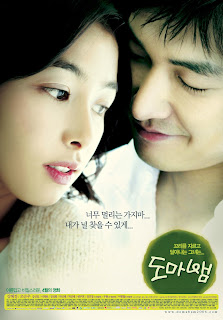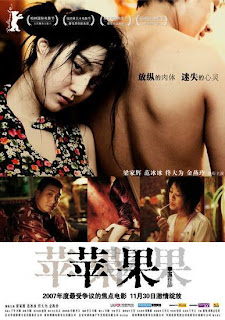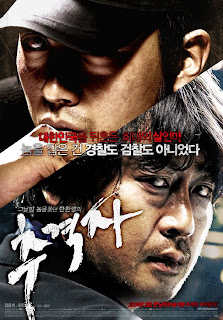
I let this one sit in queue too long. The title,
Strawberry Shortcakes, led me to believe it would be a silly slapstick chick-flick about young women engaged in madcap antics which is second only to adolescent comedies about the sexploits of silly young men on my list of film genres I hate, Asian or otherwise. Turns out,
Strawberry Shortcakes is an engaging indie film that takes a rather bleak look at the lives of four (at times I thought there were five, read on) young women who live mostly on the margins of life in contemporary Tokyo. Sex in the City it's not, quite.
One could critique this film as being superficial because it focuses primarily on the angst-ridden side of these twenty-something women's quest for love and happiness. This is a two hour movie about four very different women and I would, if I could, ask for a hand in marriage from any one of them because they are all intelligent (and dumb) and strong (and weak) and kindness means a lot to them. The portraits of these women are, almost unnervingly, complete.
There is a religious theme running through
Strawberry Shortcakes. The film begins and ends with questions and thoughts about God (big G). One of the characters is commissioned to draw a picture of God for a book cover. Hope is a constant companion to these women throughout. It's the brand of cigarettes they smoke. At one point one of the women stops by a vending machine to buy a pack and they are unavailable. She looks to the sky and asks, "Is Hope all sold out?"
A brief synopsis of who these women are:
 Toko Iwase
Toko Iwase is a bulimic, intense, sometimes bitchy, but very true to her art, artist, who makes a living doing illustration and designing book covers. Her onscreen, very visceral scenes of (binging and) purging are frighteningly realistic—very, very painful to watch. She masturbates while lying on the bed, and reading the "secret" diary of, her superficial roommate. She also folds her roommate's clothes, fixes her alarm clock, makes sure she gets to work on time, and she takes care of the funeral arrangements when her roommate's pet hamster dies. Her roommate is:
 Chihiro
Chihiro She is a beautiful, perhaps naive, perhaps sheltered office worker who sucks up to her male superiors to the disgust of her female colleagues. She's the type of woman who doesn't have any
girl friends. She tries and she hopes, in the face of all things pointing against it to have a meaningful and lasting relationship with some punk loser from her work. She buys herself a pair of shoes and has them gift wrapped for her birthday because no one else is going to honor it. When her boyfriend is too busy to see her on her birthday, she calls some dude, presumably from her past, that does nothing more than deposit his manhood on her face.
 Satoko
Satoko is a kind-hearted, sweet, plain but very cute, charming and adorable dreamer ::sigh:: who works as a receptionist at an escort agency named Heaven's Gate. When her boss asks her why she doesn't put herself on the market she says "I am not pretty like the other girls, no one would pick me." Her boss, who turns out to be falling for her responds, "Our customers like all kinds, even ugly girls. You should think about it." Ouch. She eats at a local shop where the noodles suck and the cook and sole proprietor is a young Chinese man. His "Japanese is no good" so she answers the phone for him and takes orders. She ends up working there after her boss at the escort agency treats her to an expensive dinner and makes his feelings for her known, causing her to quit. She's the type who is attracted to, and befriends, other loners such as:
 Akiyo
Akiyo She sleeps in a coffin at night and works as an escort at Heaven's Gate. She has a suitcase full of cash, saving up for a condo. It has to be fifth story or higher, for when her body fails her but before she's senile. "Anything below five stories and the fall might not kill you." She's in her late twenties and the other girls, in their early twenties, don't like her because all the customers do. She has a certain
Lena Olin tough beauty and submits to all kinds of sexual degradation in her job because it nets her more customers and more money, and because her long-time crush on an old college friend remains unrequited. Here's where the mysterious, non-existent fifth woman comes in.
 Akiyo
Akiyo wears high heels, her hair down, a lost in space demeanor, and other escort garb to work at Heaven's Gate. When she jumps on her bicycle to meet her old college friend, a self-described late bloomer (i.e., he doesn't have a full time job yet) for beers at a local dive sushi bar, she wears Converse gym shoes, frumpy ripped up blue jeans and t-shirts, puts her hair up and dons a pair of very bookish glasses. She appears very sharp, happy and focused when she is with him. It isn't meant to be ambiguous, or a secret that this is the same woman, as a second screening of the film revealed to me. I just missed it first time through.
There are many, many more subtle and poignant events that make up the complex portraits of these complex women. For me, and I don't think I'm alone in my opinion,
Toko is the centerpiece, the rock, the glue that holds this film together. The t-shirt she wears throughout most of the film has the Led Zeppelin lyric "TO BE A ROCK" on the front and "NOT TO ROLL" on the back. Turns out this actress who plays Toko is the artist/writer of a very popular manga, of nearly the same name, that this film is based upon. She is not an actress by trade and it took quite a lot of coaxing to get her to play the part. Her presence gave this film a realism I don't think it would have had without her.
Strawberry Shortcakes is not an accurate portrayal of all women in contemporary Tokyo, not even a majority, but I think
Toko, real name
Kiriko Nananan who writes under the pseudonym
Toko Iwase, put her heart and soul into painting a wonderfully authentic portrait of a segment of that population.

Having said all that about a picture I clearly enjoyed, the director's signature is all over this film as well. It's very episodic, sometimes unsatisfying in nature; many scenes are captured in an almost documentary fashion; I think the person who adapted the screenplay put in the stuff about God and Hope in an attempt to give the film a meaning others could talk about (successfully, I think, it just didn't appeal to me); and the ending was too happy and abrupt. I can't wait to watch it again.
★★★★★
 Here's another apocalyptic tale. It's not a great film but its basic premise provides a thought provoking conundrum. A suburban Los Angeles stay at home husband has just seen his city working wife off to work when a couple dirty bombs explode in the city center unleashing a toxic airborne virus. Chaos ensues as the husband attempts to get downtown and rescue, or something, his wife. (The director overused a handheld camera in this first act in an attempt to portray the hoopla and almost caused me to give up on the film.) The city is very quickly sealed off and he is unable to get to ground zero, so he goes back home. The media, when it works, informs everyone to stay inside and seal up their homes, and most importantly, to not let anyone in who may have been infected with the virus. After many hours of franticly duct-taping plastic over all the doors and windows to seal the place up air-tight ... Knock Knock! Honey, I'm home!
Here's another apocalyptic tale. It's not a great film but its basic premise provides a thought provoking conundrum. A suburban Los Angeles stay at home husband has just seen his city working wife off to work when a couple dirty bombs explode in the city center unleashing a toxic airborne virus. Chaos ensues as the husband attempts to get downtown and rescue, or something, his wife. (The director overused a handheld camera in this first act in an attempt to portray the hoopla and almost caused me to give up on the film.) The city is very quickly sealed off and he is unable to get to ground zero, so he goes back home. The media, when it works, informs everyone to stay inside and seal up their homes, and most importantly, to not let anyone in who may have been infected with the virus. After many hours of franticly duct-taping plastic over all the doors and windows to seal the place up air-tight ... Knock Knock! Honey, I'm home!






























